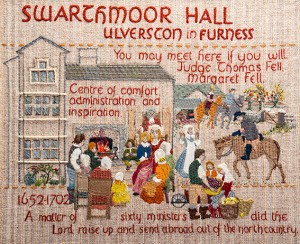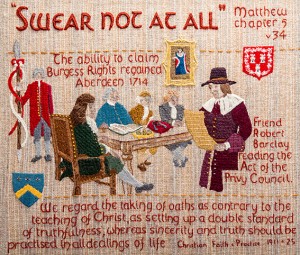The early history of the Quaker movement centred on the North West of England. There are therefore strong connections with Lancaster Castle which, as a court and prison, served as the regional seat of state power and control at that time. Jenny Paull and Elizabeth Roberts give an overview here of Quaker connections with the Castle from the imprisonment and trials here of Quaker Friends in those early days to Quakers’ later role as proponents of prison welfare.
The Quakers and Lancaster Castle
Posted by Jenny Paull and Elizabeth Roberts

QUAKER TAPESTRY – SWARTHMOOR HALL: Quaker Tapestry © This image is one of the 77 illustrations known as the Quaker Tapestry which is a community textile of embroidered panels made by 4,000 people from 15 countries. The exhibition of life, revolutions and remarkable people can be seen at the Quaker Tapestry Museum in the Quaker Meeting House in Kendal, Cumbria UK www.quaker-tapestry.co.uk
George Fox and the Founding of the Religious Society of Friends
The Quaker association with Lancaster Castle dates from the earliest days of the Religious Society of Friends (Quakers). George Fox, the acknowledged founder of the Quakers, began his ministry in the North West of England in 1652. By October of that year he had caused so great a furore among the religious and political leaders of the area that he was brought before the court of Lancaster Castle accused of blasphemy.
His ministry in the North West had begun after he had climbed Pendle Hill where he had a vision of ‘a great people to be gathered’ [1]. This led him to travel and preach throughout the North. In late June 1652 he arrived at Swarthmoor Hall near Ulverston, the home of Judge Thomas Fell and his wife Margaret. The Judge, although away at the time, had a reputation for welcoming travelling preachers. On his arrival Fox was not only heard by the family but he also convinced Margaret and her daughters. With the judge’s support and Margaret Fell’s deep faith, determination and ingenuity, Fox made Swarthmoor the base for the Society of Friends for several decades.
From the beginning the Quakers were persecuted for holding and attending meetings, blasphemy, or interrupting priests’ sermons in churches.
Persecution of Quakers
The founding of the Society came during a time of great political and religious uncertainty after the English Civil War. From the beginning the Quakers were persecuted for holding and attending meetings, blasphemy, or interrupting priests’ sermons in churches. Later, laws against the refusal to pay tythes to the Church of England and, after the restoration of the monarchy in 1660, refusing to swear an oath of loyalty to the Crown, caused thousands of Friends to be imprisoned. The refusal of the oath was based on two biblical quotations against the swearing of oaths. It was, and is, against the Quaker testimony to truth which means that Quakers try to be truthful in word and deed. It was against Quaker principles to pay tythes to the Church as not only did they not support it but they also saw it as corrupt.
At one stage during the 1680s, hundreds of Quakers were imprisoned in the Castle, most commonly for non-payment of tythes but also for the refusal to swear the oath to the crown. Elsewhere many suffered terrible punishments for their faith, including severe beatings. Women were especially vulnerable to beatings and assaults.
At one stage during the 1680s, hundreds of Quakers were imprisoned in the Castle, most commonly for non-payment of tythes but also for the refusal to swear the oath to the crown.
Trials and Imprisonments of Quakers at Lancaster
Of the many Quakers imprisoned in the Castle a few actually came to trial. The most famous trials, simply because they were recorded, were those of Margaret Fell and George Fox. At her trial in 1664 Margaret Fell refused to take the oath, complained about the prison conditions and argued with the judge. After a second trial she was sentenced to four years imprisonment in the Castle.
At his trial at the same Assizes, George Fox also got into an argument with the judge because he refused to remove his hat. ‘Hat honour’ or the removing of hats by men in the presence of a social superior was expected in the seventeenth century, but, following their testimony to the equality of all people before God, Quakers did not observe this practice. Fox persuaded some of the justices to go up to the place where he was imprisoned. He wrote ‘and when they came up they were durst scarcely to go. It was bad… rain and windy, and the badness of the floor… and others that came up said that it was a jakes house’ (toilet) [2].
The bad prison conditions were responsible for ill health and even death among many Quaker prisoners. Thirteen are known to have died in the Castle. Deaths were due to disease, injuries, from violent arrest or existing illnesses exacerbate by prison conditions. The last known Quaker prisoner to die in there was in 1720. In the early eighteenth century there was still a number of Friends being held for non-payment of tythes.
At her trial in 1664 Margaret Fell refused to take the oath, complained about the prison conditions and argued with the judge.

QUAKER TAPESTRY – OATHS: Quaker Tapestry © This image is one of the 77 illustrations known as the Quaker Tapestry which is a community textile of embroidered panels made by 4,000 people from 15 countries. The exhibition of life, revolutions and remarkable people can be seen at the Quaker Tapestry Museum in the Quaker Meeting House in Kendal, Cumbria UK www.quaker-tapestry.co.uk
Quakers and Prison Welfare
In 1818 the Castle was visited by Elizabeth Fry, the Quaker prison reformer. She came to the Castle as part of a tour undertaken with her brother, Joseph John Gurney, during which they were inspecting prisons as part of the Quaker campaign for prison reform.
During the Second World War there were conscientious objectors held in the Castle. Local Quakers assisted these men and their families who were visiting them. The Quaker commitment to prison welfare continues to the present day and there are Quaker chaplains and visitors in many prisons.
Each year the Castle has many Quaker visitors who come to see it because of its importance to Quaker history.
At his trial at the same Assizes, George Fox also got into an argument with the judge because he refused to remove his hat.
- Brockway, F., 2010. Inside the Left: Thirty Years of Platform, Press, Prison and Parliament. 2nd edition. Nottingham: Spokesman Books.
- Ellsworth-Jones, W., 2008. We Will Not Fight…: The Untold Story of World War One’s Conscientious Objectors. London: Aurum Press Ltd.
- Lancaster Observer and Morecambe Chronicle, various editions from 1921 & 1922.

